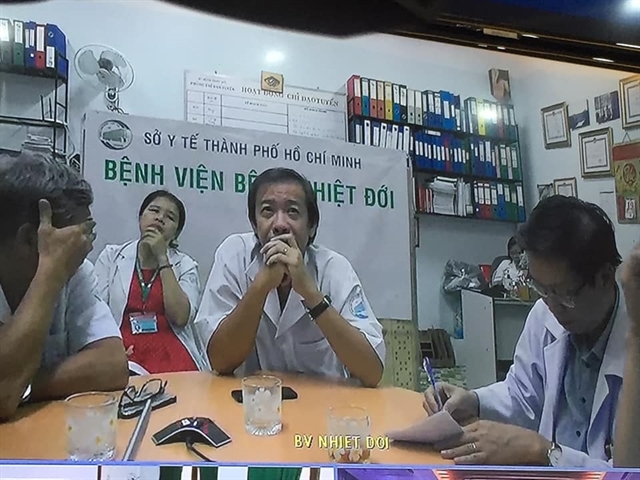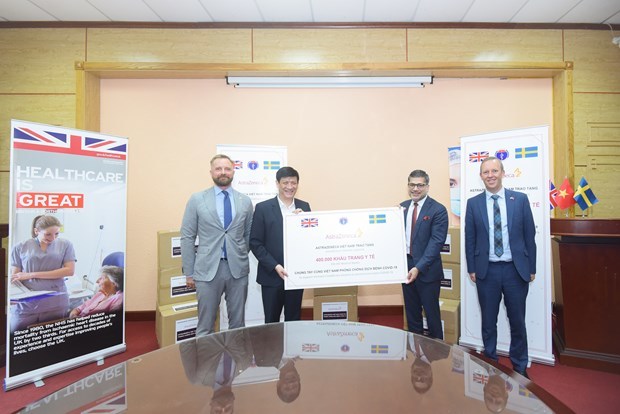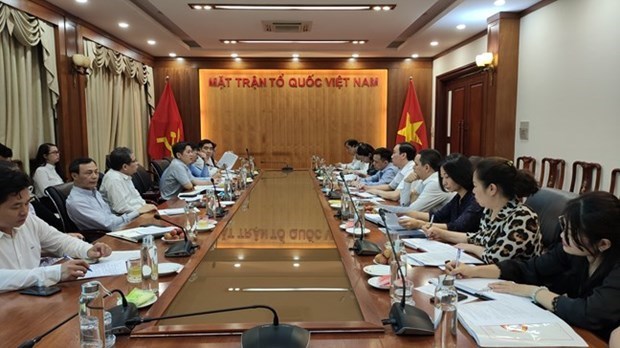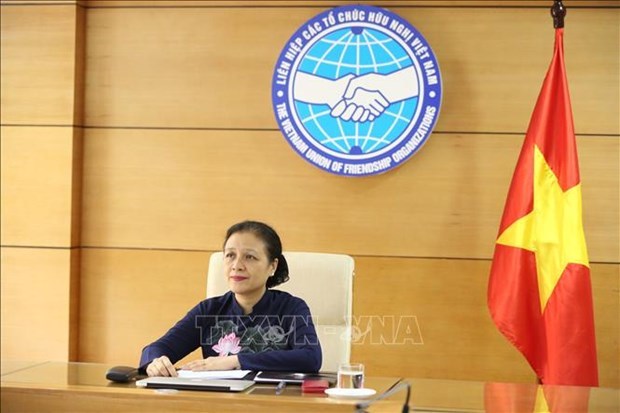 |
| Doctors at the telemedicine conference on Tuesday. — Photo suckhoedoisong.vn |
The country's 91st COVID-19 patient, a British pilot, will be transferred to the intensive care centre in HCM City’s Chợ Rẫy Hospital to have a lung transplant when the patient is healthy enough for the procedure.
The hospital has improved its intensive care centre to ensure the highest safety before receiving the patient for further treatment.
This was the conclusion made at a telemedicine conference of leading doctors in the country on Tuesday to find optimal ways to save the patient.
Lương Ngọc Khuê, head of the Health Ministry's Department of Medical Examination and Treatment, said the Association of Young Vietnamese Entrepreneurs and many donors were willing to cover all medical expenses of treatment and lung transplant for the patient.
Also at the meeting, the doctors said the second computed tomography (CT) scan of the critically-ill British pilot – the 91st patient – showed positive improvements. About 20 to 30 per cent of his lungs have recovered.
The patient still has to depend completely on Extracorporeal Membrane Oxygenation (ECMO). Without the support, he will die. If his lungs do not recover, the only way to save him is a lung transplant, Nguyễn Văn Vĩnh Châu, director of HCM City’s Hospital for Tropical Diseases said.
The patient has been on ECMO for 44 days. The patient has undergone two CT scans, one on Monday and another on May 13.
The first CT scan images on May 13 showed severe solidification and fibrosis of the lungs, making it difficult for oxygen to get into the patient’s blood. Only 10 per cent of his lungs were working.
The 43-year-old male patient remains the most difficult COVID-19 case in Việt Nam, with a complicated disease progression since he was hospitalised on March 18 at HCM City Hospital for Tropical Diseases. During two months of treatment, his condition has fluctuated with several changes in COVID-19 testing results.
Many Taiwanese experts arrive in Vietnam for work
 |
|
The flight transporting 158 Taiwanese experts landed at Van Don International Airport on Tuesday
|
A flight with 158 Taiwanese experts coming to work in Vietnam landed at the northern province of Quang Ninh’s Van Don International Airport on Tuesday.
This is the first time Van Don International Airport has received a flight from Taiwan. All passengers on the flight conducted by Eva Air were given a temperature check, had to wear a mask and fill in a health report.
They will be quarantined for 14 days as regulated.
Vietnam has served many flights transporting foreign experts who came to the country for work as well as those bringing Vietnamese nationals abroad to return home.
Since the Covid-19 outbreak, Van Don International Airport has served 36 flights carrying Vietnamese people who repatriated and 20 other flights to bring foreign experts to the country for work, including 11 flights transporting South Korean experts.
Passenger without face mask reported at Cat Bi Airport
Vietnam Airlines have reported a passenger who did not follow face mask regulations on a flight from HCM City to Hai Phong.
The man booked a business class ticket on the VN1182 flight of Vietnam Airlines. As passengers are required to wear face masks, the flight attendants had asked the man to wear his mask several times but he refused to comply during the flight.
In the end, the crew members reported the man and transferred the case to the authorities at Cat Bi Airport. After landing in Hai Phong, the man was forced to leave the plane as a passenger whose service was refused.
According to Resolution 162 about administrative fines in the civil aviation industry, those who do not follow the guidelines on ensuring security, aviation safety and disease prevention by the crew members will be fined from VND1m to VND3m.
Civil Aviation Administration of Vietnam said they were still implementing and monitoring Covid-19 preventive measures that are on par or tighter than the requirements from the Ministry of Health and the Ministry of Transport such as completing a medical declaration, taking body temperature, and refusing flights for passengers that have symptoms and reporting to the medical team at the airport.
Passengers must wear face masks in order to get through the security gate. They are also required to wear face masks during the flight.
No new community COVID-19 infections reported in Vietnam for 34 days
|
|
|
A woman has temperature checked (Photo: VNA)
|
Vietnam has gone 34 straight days without new COVID-19 infection cases in the community, according to the National Steering Committee for COVID-19 Prevention and Control.
As of May 20 morning, the total infections in the country remained at 324, including 184 imported cases that had been quarantined upon their arrival.
More than 80 percent of the patients have recovered, and zero death has been reported, said the committee’s treatment subcommittee.
The most serious case is patient No.91 tested negative for SARS-CoV-2 five times.
Meanwhile, 60 positive cases are being treated at medical facilities across the country.
At present, 7,954 people having contact with patients or entering from pandemic-hit areas are being quarantined for health monitoring, including 331 at hospitals, 5,187 at concentrated quarantine centres, and 2,427 at home./.
340 Vietnamese citizens brought home from India
 |
| All passengers and crew members must strictly follow preventive measures against COVID-19. |
Vietnam's relevant agencies and representative offices in India on May 19-20 coordinated with Indian counterparts to bring home nearly 340 Vietnamese citizens.
Passengers on a Vietnam Airlines flight include children, the elderly, people with illnesses, pregnant women, students without accommodation due to school closures, stranded tourists, Buddhist monks and nuns attending training courses, and those with expired labour contracts.
As India is applying nationwide lockdown to prevent the spread of COVID-19, it is difficult to carry out such flights.
The Vietnamese Embassy in New Delhi and the Vietnamese Consulate General in Mumbai guided Vietnamese citizens to conduct all necessary procedures, while actively working with the host’s authorised agencies to bring Vietnamese citizens home.
Passengers and crew members were quarantined upon arrival in the Can Tho international airport./.
AstraZeneca Company donates 400,000 medical masks to Vietnam
 |
|
Vietnamese Deputy Minister of Health Nguyen Thanh Long (second, left) receives the token of 400,000 medical masks from Nitin Kapoor, Chairman of AstraZeneca Vietnam (second, right). (Photo courtersy of the British Embassy in Vietnam)
|
The UK-based AstraZeneca Company has donated 400,000 medical masks to the Ministry of Health to support Vietnam's fight against the COVID-19 pandemic.
The handover ceremony on May 19 was attended by Vietnamese Deputy Minister of Health Nguyen Thanh Long, British Ambassador to Vietnam Gareth Ward, and Head of Trade Promotion, Economic and Political Affairs of the Swedish Embassy in Vietnam Johan Alvin.
“We are touched by the lifesaving work of Vietnamese healthcare workers who have helped British nationals infected by COVID-19 in Vietnam, and continue to be reassured by the collective efforts of the Vietnamese government and people in responding to COVID-19,” Gareth Ward spoke at the event.
“This donation by AstraZeneca is a strong example of how the UK-Vietnam strategic partnership, celebrating this year its 10th anniversary, is driven forward by cross-sector partners, who want to make meaningful and long-lasting contributions to Vietnamese society,” he said.
Nitin Kapoor, Chairman of AstraZeneca Vietnam, said: “AstraZeneca truly appreciates Vietnam’s effective measures in fighting the pandemic.”
The donations aim to enhance the effectiveness of COVID-19 prevention and add on the company’s donation to fund the procurement of specified medical protection equipment for healthcare workers at the National Hospital for Tropical Diseases in March, he said.
Kapoor further noted that by leveraging digital engagement, his firm has connected more than 5,000 Vietnamese healthcare practitioners with global clinical expertise to equip them with the latest knowledge on COVID-19 as they continue to care for especially vulnerable patients with diseases such as asthma, diabetes and cancer.
AstraZeneca, a global, science-led biopharmaceutical company, has deep heritage in both Sweden and the UK, with strategic R&D, manufacturing and commercial operations based in both countries./.
Overseas Vietnamese support COVID-19 fight in homeland
 |
|
|
Overseas Vietnamese (OVs) in many countries have donated money to help with the fight against the COVID-19 pandemic in the homeland.
At a ceremony in Hanoi on May 19, Deputy Foreign Minister and Chairman of the State Committee for Overseas Vietnamese Affairs (COVA) Dang Minh Khoi handed over 4.6 billion VND (nearly 197,000 USD) presented by individuals and organisations of OVs to the Vietnam Fatherland Front (VFF) Central Committee.
Also at the ceremony, the COVA received 50,000 face masks that the VFF Central Committee sent to OVs in the US who are facing difficulties due to the pandemic.
Deputy FM Khoi said OVs all over the world have warmly responded to the call of Party General Secretary and President Nguyen Phu Trong, the appeal of the Presidium of the VFF Central Committee and the directive of Prime Minister Nguyen Xuan Phuc, and raised support for efforts to fight COVID-19 in Vietnam.
He stressed that the meaningful support reflects the tradition of solidarity, the patriotic spirit and the compassion of the OV community abroad.
President of the VFF Central Committee Tran Thanh Man announced that the VFF has so far received over 2 trillion VND worth of support in both cash and kind donated by agencies, businesses, organisations and individuals both in and outside the country.
Initial statistics of the COVA showed OVs have donated more than 34 billion VND and large volume of medical supplies as of May 19./.
ASEAN, China's friendship organisations hold video meeting on COVID-19
 |
|
President of the Vietnam Union of Friendship Organisations (VUFO) Nguyen Phuong Nga attends the special video meeting between friendship organisations of ASEAN member nations and China on May 19. (Photo: VNA)
|
Leaders of friendship organisations of ASEAN member nations and China held a special video meeting on May 19 to discuss response to the COVID-19 pandemic and ways to boost people-to-people exchanges in the new situation.
Speaking at the event, President of the Vietnam Union of Friendship Organisations (VUFO) Nguyen Phuong Nga shared Vietnam’s experience in combating COVID-19, with the motto “fighting the epidemic like fighting the enemy” kept in mind.
As the ASEAN Chair 2020, Vietnam has worked closely with other member states to contain the novel coronavirus through an unified, multi-sectoral and community-based approach, she said.
The ASEAN countries, in many ways, have cooperated closely with the World Health Organisation (WHO) and partners, including China, to produce prompt and effective response to the COVID-19 pandemic, Nga added.
She urged the countries to maintain a peaceful, stable and cooperative environment in the region to push back the epidemic and economic recession.
Solidarity and mutual assistance are the key for all countries to overcome this difficult time, she said.
Nga went on to say that VUFO is committed to coordinating closely with friendship organisations of the ASEAN nations to enhance exchanges and foster partnership between them and China./.
Japanese, Singaporean newspapers praise Vietnam's response to COVID-19
 |
|
The Ngoc Son Temple in downtown Hanoi is sterilised to prevent the COVID-19.
|
Vietnam is now reaping strategic gains from its nimble response to the COVID-19 pandemic, Tan Hui Yee, Indochina Bureau Chief in Bangkok, wrote in an article published in The Strait Times on May 18.
Schools have reopened and buses are running as usual in the country, which has gone for a month without seeing community transmission of the coronavirus, he said, adding that investor interest - which shrivelled up early this year - is picking up again.
Vietnam’s export of face masks and test kits, meanwhile, could help cushion the larger economic impact of the pandemic, he wrote.
The article quoted Trent Davies, a Vietnam-based international business advisory manager at consultants Dezan Shira & Associates, as saying that everything was put on hold in the first month or two of the COVID-19 outbreak, but now his company is already receiving inquiries from interested investors about doing business in Vietnam.
“Being ahead of the curve, the ASEAN Chair [Vietnam] is in good stead to lead and shape regional responses to the pandemic,” Dr Huong Le Thu, Senior Analyst at the Australian Strategic Policy Institute, was quoted as saying.
“No country can recover on its own, but those in better shape and that emerge from this crisis relatively earlier will be in a better position - and also have strategic bandwidth - to take some leadership initiative,” she said.
Meanwhile, Japanese economics newspaper Nihon Keizai on May 19 published an analysis by Chief Market Economist Ueno Yasunari from Mizuho Securities highlighting the effectiveness of Vietnam’s measures to curb the spread of COVID-19.
Vietnam has a population of 97 million people but has only reported some 300 infections and zero fatalities, showing that the country’s way of containing the virus was more effective than elsewhere, he wrote.
What made Vietnam succeed was quarantining infected people from the early days and aggressively tracing those with whom they had contact, he explained./.
Vietnam yet to confirm COVID-19 patient infected while in Cambodia: Ambassador
 |
| Vietnam yet to confirm COVID-19 patient infected while in Cambodia: Ambassador hinh anh 1 Ambassador to Cambodia Vu Quang Minh |
Vietnam has yet to confirm when, where and how Patient 315 contracted the COVID-19, Ambassador to Cambodia Vu Quang Minh has said.
Vietnam, therefore, has still yet to confirm that the patient was infected while he was in Cambodia, and it initially only searched for and quarantined 17 people who had close contact with the man after he returned home, the diplomat told the Vietnam News Agency (VNA).
On May 16, VNA’s Viet Nam News quoted the National Steering Committee for COVID-19 Prevention and Control as saying that the 39-year-old man returned to Vietnam from Siem Reap through southern Tay Ninh province on May 2 without any legal document.
On May 5, he tested negative for SARS-CoV-2 but on May 15 tested positive.
Though Vietnam has not yet affirmed that the patient became infected during his stay in Cambodia, it still quarantines suspected cases and announces part of the places he had travelled to so that those in contact with him can be alerted and report to Vietnamese authorities.
The Ministry of Health has been closely coordinating and exchanging information regularly with its Cambodian counterpart in an effort to fight the pandemic, Minh said.
“We laud Cambodia for its efforts and achievement in successfully curing all the 122 of its COVID-19 patients and keeping the country clear of new cases for 36 days, as reported by the Cambodian Health Ministry,” he said.
The Vietnamese Embassy and representative press agencies of Vietnam will hold a working session with the Cambodian Ministry of Health and Ministry of Information regarding the pandemic, especially in the context of it being basically contained in both countries, the diplomat added./.
Clear, early communication contributes to success in COVID-19 fight: NZ Herald
Daily newspaper the New Zealand Herald recently ran an article on the factors that contributed to Vietnam’s successful fight against COVID-19, with the country not having recorded a community infection for more than a month.
It quoted an expert from the Australian Strategic Policy Institute as saying that the success is down to clear communication from the Government, which also came early.
“Government warnings to residents were frank about the dangers of the coronavirus and the lack of broader medical and clinical resources if a large outbreak were to take hold,” the expert said.
The article emphasised that massive, early, and large-scale testing also contributed to the country’s success.
Vietnam had only three labs in January that could test for COVID-19 but by April had 112.
“The steps are easy to describe but difficult to implement,” said Matthew Moore, a Hanoi-based official from the US Centers for Disease Control and Prevention (CDC), adding that Vietnam “has been very successful at implementing them over and over again.”
He has been trading information with the Vietnamese Government since the country reported its first cases in January and said the country had “great confidence” in its Government.
Vietnam has reported 324 COVID-19 cases to date, with no fatalities. Some 263 patients have recovered./.
Indonesia: No relaxation of large-scale social restriction policy
The Indonesian government has no plans to ease the enactment of the Large Scale Social Restriction (PSBB) policy in the immediate future, as the government is still focusing on the national mudik (homecoming) ban for the next two weeks to curb the spread of COVID-19, said President Joko Widodo.
Speaking at an online cabinet meeting on May 18, Widodo stressed that there is no relaxation of the PSBB policy, the public should not be mistaken that the government has begun to relax PSBB.
He asked the Chief of the Indonesian Police Force, General Idham Azis, as well as the Commander of the Indonesian National Armed Forces, Marshall Hadi Tjahjanto, to ensure the effective enforcement of the mudik ban.
The President has also reminded that the mudik ban is only applicable to limit the mobility of people, not goods.
According to Widodo, the government is preparing PSBB easing scenarios and continues to monitor disease developments before making a decision on the time for applying.
Previously, on May 15, President Joko Widodo called on Indonesians "to live" with the COVID-19 pandemic as part of the new normal.
As of May 18, Indonesia confirmed 18,010 COVID-19 patients. The disease killed 1,191 persons in the country, while 4,324 cases were cured./.
